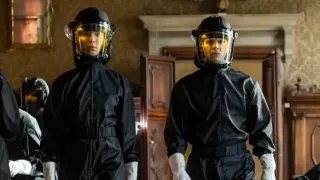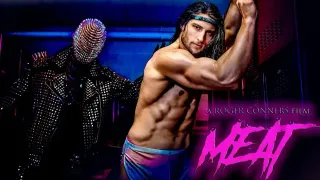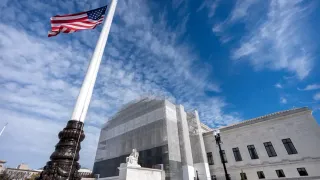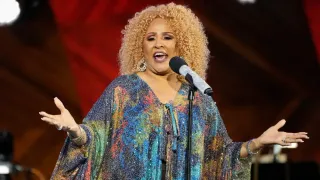June 18, 2023
West Virginia Basketball Coach Bob Huggins Resigns Hours after Drunken Driving Arrest
John Raby READ TIME: 5 MIN.
West Virginia basketball coach Bob Huggins has resigned a day after his arrest on suspicion of drunken driving in the latest incident in a Hall of Fame career that imploded quickly.
The West Virginia University announced the resignation Saturday night. It came a month after the university suspended him for three games for using an anti-gay slur while also denigrating Catholics during a radio interview.
The 69-year-old Huggins leaves as the third-winningest coach all-time in Division I with 935 career victories, behind only Mike Krzyzewski of Duke (1,202) and Jim Boeheim of Syracuse (1,015), both of whom are retired. Unlike the others, Huggins had no national titles, taking Cincinnati to the Final Four in 1992 and West Virginia in 2010.
Huggins had 16-year stints each with the Bearcats and Mountaineers. Both ended in the aftermath of arrests for drinking and driving.
Huggins was charged with driving under the influence on Friday night after his SUV had stopped in the middle of traffic in Pittsburgh with a shredded tire and the driver's-side door open at about 8:30 p.m. According to a criminal complaint, a breath test determined Huggins' blood alcohol content was more than twice the legal limit.
Huggins was charged with DUI, released from custody and will appear at a later date for a preliminary hearing, according to a police report.
In a statement to the West Virginia community on Saturday night, Huggins said: "Today, I have submitted a letter to President Gordon Gee and Vice President and Director of Athletics Wren Baker informing them of my resignation and intention to retire as head men's basketball coach at West Virginia University effective immediately."
In a separate statement Saturday night, West Virginia's athletic department said it accepted the resignation "in light of recent events.
"We support his decision so that he can focus on his health and family. On behalf of West Virginia University, we share our appreciation for his service to our University, our community and our state."
No replacement was immediately named for Huggins. The athletic department statement said that "in the days ahead, we will focus on supporting the student-athletes in our men's basketball program and solidifying leadership for our program."
Huggins said his recent actions do not represent the university's values or the leadership expected in his role as coach.
"While I have always tried to represent our University with honor, I have let all of you – and myself – down," he said. "I am solely responsible for my conduct and sincerely apologize to the University community – particularly to the student-athletes, coaches and staff in our program. I must do better, and I plan to spend the next few months focused on my health and my family so that I can be the person they deserve."
Huggins added that it was "the honor of my professional career" to lead the team at his alma mater. Born in Morgantown, he said it "will always be my home, and I will always be a Mountaineer. Thank you to everyone who has supported our program over the years. It has meant more to me and my family than you could ever know."
On Friday night, officers directed Huggins to move off the road so they could help with the tire, then activated their lights when they observed Huggins having trouble maneuvering the SUV to allow vehicles to pass. Upon questioning, officers suspected he was intoxicated and asked him to exit the vehicle. The report said he failed standard field sobriety tests, was taken into custody without incident and transported for further testing.
It was Huggins' second such arrest. The other occurred in 2004, when he was the head coach at Cincinnati.
In June 2004, Huggins pleaded no contest to driving under the influence in a suburb of Cincinnati and was ordered to attend a three-day intervention program. The University of Cincinnati suspended him indefinitely with pay and told Huggins to rehabilitate himself.
Huggins was allowed to return to work two months later, saying that "I made a terrible mistake, and what bothers me most is I hurt other people. All I can do is work like crazy to be a better person, a better coach, be better at everything I do and make those people proud of me."
By 2005, Huggins' Cincinnati career was over; he was fired amid a power struggle with the school's president as well as the aftermath of the 2004 arrest.
After spending one season at Kansas State, Huggins took his dream job at West Virginia in 2007.
Last month, Huggins agreed to a three-game suspension, a $1 million salary reduction and sensitivity training for using the slur during an interview with Cincinnati radio station WLW. Huggins was asked about the transfer portal and whether he had a chance of landing a player at West Virginia from Xavier, a Jesuit school.
"Catholics don't do that," Huggins said. "I tell you what, any school that can throw rubber penises on the floor and then say they didn't do it, by God they can get away with anything.
"It was the Crosstown Shootout. What it was, was all those (expletive), those Catholic (expletive), I think."
In a joint statement later that week, Gee and Baker said the university "made it explicitly clear to Coach Huggins that any incidents of similar derogatory and offensive language will result in immediate termination."
Huggins' salary of $4.15 million had been reduced by $1 million after the slur. That reduction was to be used to directly support WVU's LGBTQ+ Center, as well as a mental health center at the university and other groups that support marginalized communities. At the time, he was suspended for the first three games of the 2023-24 season. In addition, his contract was amended from a multiyear agreement to a year-by-year agreement that began on May 10.
Huggins entered the Basketball Hall of Fame last September. In 41 seasons, his teams have gone to 25 NCAA Tournaments, finished ranked in the top 10 of The Associated Press poll seven times and finished under .500 five times. The Mountaineers have 11 NCAA Tournament appearances under Huggins.
Huggins had assembled a solid group from the transfer portal for next season, including Syracuse center Jesse Edwards, Arizona guard Kerr Kriisa, Manhattan guards Jose Perez and Omar Silverio, and Montana State guard RaeQuan Battle.
"Man.. I knew the dude 3 months but felt like forever," Kriisa said Saturday night on Twitter. "So thankful for really believing in me and taking me as part of your family forever. Love u coach."
___
This story has been corrected to show that Jim Boeheim of Syracuse finished his coaching career with 1,015, not 998, wins.






